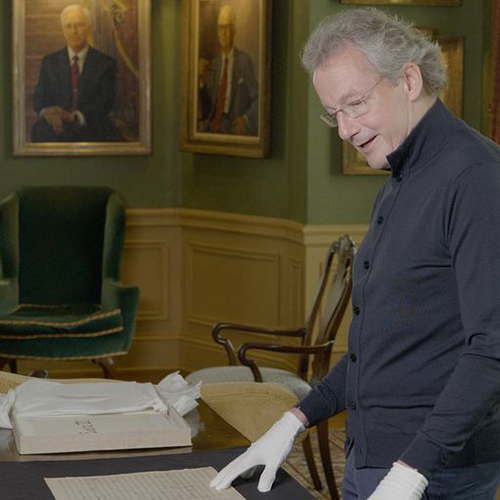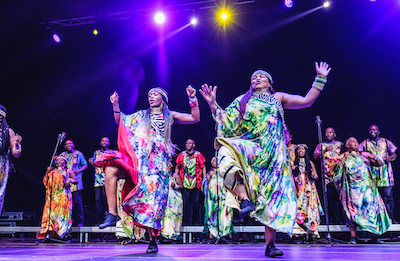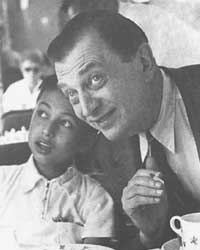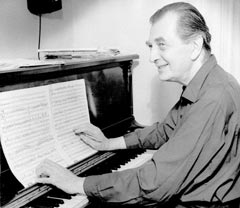by Jarrett Hoffman

•Tonight: The Cleveland Orchestra celebrates Mahler 2 manuscript gift, and Oberlin Chamber Orchestra pairs classics with a student composition
•New date for the Soweto Gospel Choir at Tuesday Musical
•A handful of remote job openings
•Almanac: “Meet the Tcherepnins!” (particularly Alexander) and a plea for a synonym
HAPPENING TODAY:
In yesterday’s Diary we shared the news of a gift recently received by The Cleveland Orchestra: the autograph manuscript of Gustav Mahler’s Symphony No. 2, “Resurrection,” donated by Austrian media executive and philanthropist Herbert G. Kloiber, one of the Orchestra’s Trustees.
In honor of the occasion, the work will be performed tonight and tomorrow at 7:30 pm in Mandel Hall to open the ensemble’s season. Franz Welser-Möst, The Cleveland Orchestra, and the Cleveland Orchestra Chorus will be joined by soloists Lauren Snouffer, soprano, and Marie-Nicole Lemieux, mezzo-soprano. Plus, Severance Hall’s Grand Foyer will have its own “guest soloist” — the manuscript itself, which will be on display for those in attendance. Tickets are available here.
Also at 7:30, Raphael Jiménez and the Oberlin Chamber Orchestra will be stationed at Finney Chapel for a program of Humperdinck’s Prelude to Hansel and Gretel, Dvořák’s Symphony No. 8, and Oberlin student composer Isaac Santos’ moon seen through leaves. The concert is free.

A new date has been set for Tuesday Musical’s presentation of the Soweto Gospel Choir. “Hope — It’s Been a Long Time Coming,” a program that includes South African Freedom Songs, gospel music, spirituals, and music of the American Civil Rights Movement, will be performed on Sunday, November 27 at 7:30 pm at E.J. Thomas Hall.
Originally scheduled for October 2, the concert — and in fact the Choir’s entire European and American tour — was delayed due to travel issues. Tickets for the original date are automatically valid for the new date. If you would like a refund, call 330-761-3460 or send an email here no later than Thursday, October 11. Those who haven’t yet purchased tickets can do so here.
JOB OPENINGS:
A handful of remote positions are available with organizations around the country.
The National Flute Association (based in Chicago) is looking for a full-time Communications Manager, G. Schirmer (New York City) seeks a part-time Executive Assistant to the President, and the Gateways Music Festival (Rochester) is on the lookout for a full-time Vice President & Chief Development Officer. (Another company on the list, Universal Music Group, has a preference for West Coast applicants.) Head to Musical America’s Career Center for details.

One of the remarkable families in classical music history is the Tcherepnins, with four generations of composers and performers dating back to 1873. That begins with Nikolai and Maria (herself part of a heavily artistic family), followed by Alexander and Lee Hsien Ming, their sons Serge and Ivan, and Serge’s sons Sergei and Stefan — a lineage that connects the Ballets Russes to innovations in modular synthesizers and beyond. (Left: Alexander and Ivan.)
Not to worry, I’m working on the elevator pitch for the sitcom: “Meet the Tcherepnins!”
Today’s date means that we focus on composer-pianist Alexander Tcherepnin (1899-1977, when he died on September 29). Born in St. Petersburg like his father, he was surrounded by political upheaval during his youth, moving with his family to Tbilisi after the Russian Revolution, then to Paris after the Soviet Invasion of Georgia.
It was in France where Alexander launched an international career that took him frequently to the U.S., Japan, and China — where he met his wife, pianist Lee Hsien Ming. After settling in Chicago, they both taught at DePaul University, where his students included Robert Muczynski, Phillip Ramey, and Gloria Coates.

(Readers are urged to call in with any possible synonyms for the word symphony. The situation is, frankly, dire.)
As a side note, the second movement of his Symphony No. 1, from decades earlier, was the first symphonic movement in history to be written completely for unpitched percussion — listen here from the Singapore Symphony. Perhaps that can make up for the fact that one of his symphonies left incomplete at his death was to have been for percussion alone.
After moving to New York in the ‘60s and splitting time there and across the Atlantic, he died where his career began: in Paris.



